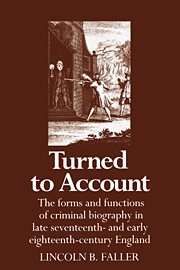 Turned to Account
Turned to Account Book contents
- Frontmatter
- Contents
- Preface
- Part I Turning criminals to account: three case histories and two myths of crime
- Part II Enucleating the truth: the criminal as sinner turned saint
- Part III Palliating his crimes: the thief as various rogues
- 6 Smiles, serious thoughts, and things beyond imagining: a provisional typology of thieves in action
- 7 Barbarous levities: fear, guilt, and the value of confusion
- 8 Everyone left to his own reflections: the oddity of the highwayman as hero and social critic
- Postscript: Criminal biography and the novel
- Appendix I Who read the popular literature of crime?
- Appendix II The politics of thieving
- Notes
- Select bibliography
- Index
6 - Smiles, serious thoughts, and things beyond imagining: a provisional typology of thieves in action
Published online by Cambridge University Press: 05 February 2012
- Frontmatter
- Contents
- Preface
- Part I Turning criminals to account: three case histories and two myths of crime
- Part II Enucleating the truth: the criminal as sinner turned saint
- Part III Palliating his crimes: the thief as various rogues
- 6 Smiles, serious thoughts, and things beyond imagining: a provisional typology of thieves in action
- 7 Barbarous levities: fear, guilt, and the value of confusion
- 8 Everyone left to his own reflections: the oddity of the highwayman as hero and social critic
- Postscript: Criminal biography and the novel
- Appendix I Who read the popular literature of crime?
- Appendix II The politics of thieving
- Notes
- Select bibliography
- Index
Summary
The Reader may depend upon having the most authentic Accounts of every Highwayman, &ct. that can be any where procured, and of having those Accounts in a more agreeable Manner than they have ever yet appeared in. Our Reflections, when we make any, shall be just, and naturally arising from the Story, whether they are calculated to raise a Smile or a serious Thought.
Charles Johnson, Highwaymen (1734), p. [2]But though his life was strange and most unaccountable, yet his death was not less admirable. For having done things beyond imagination, the fame, or rather infamy of Dun increasing every day, the country resolved no longer to endure his insolencies.
Alexander Smith, Highwaymen (1719a), p. 17Her … Pranks and Feats will be good diversion to the honest and ingenious, and to him they are commended, desiring him to Excuse the Abruptness and Discontinuance of the Matter, and the severall independencies thereof; for that it was impossible to make one piece of so various a Subject, as she was both to herself and others.
Life and Death of Mary Frith (1662), sig. A6rIn short, his whole Life … was as confused as the Account which we now give of it. He was one Day a Saint, the next a Lover, the next a Satirist, and the next a Highwayman, or Imposter, according as the occasion offered.
Johnson, Highwaymen (1734), p. [2]In their several characters the reader will find the most unaccountable relations of irregular actions as ever were heard.
Smith, Highwaymen (1719a), p. 1- Type
- Chapter
- Information
- Turned to AccountThe Forms and Functions of Criminal Biography in Late Seventeenth- and Early Eighteenth-Century England, pp. 125 - 148Publisher: Cambridge University PressPrint publication year: 1987


